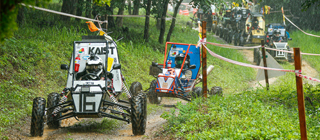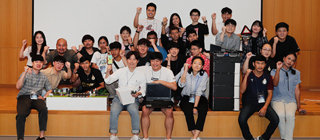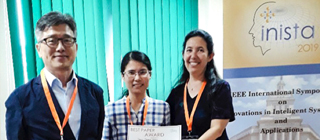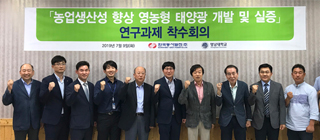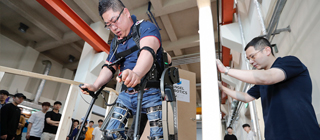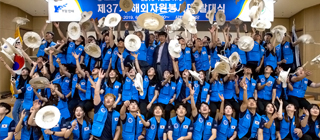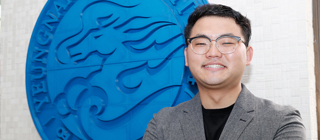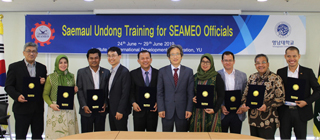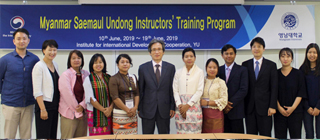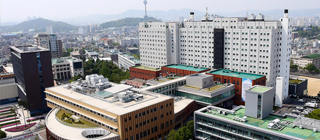-
YU’s ‘YUSAE’ team takes overall victory... Won 4 straight years to become the top university 23 teams from 18 universities competed at the YU Gyeongsan Campus from the 17th to 20th Comprehensive evaluation including design, safety, braking and durability [July 20, 2019] The 2019 Baja SAE completed its four-day race of passion and held its finale on the 20th. It rained a lot throughout the tournament because of the typhoon Danas, but it was not enough to stop the race of passion by college students toward their dreams. This was the 24th tournament this year and it was joined by 23 teams from 18 universities including the Korea Advanced Institute of Science and Technology, Kyonggi University, Wonkwang University and Korea University of Technology and Education. This tournament began on the 17th at the YU Gyeongsan Campus. Following the static test to check the vehicle design’s uniqueness, safety, ease of maintenance, and possibility for mass production, a dynamic tests on acceleration, max speed, rock climbing, and passing mud roads were conducted. On the 20th, the last day of the tournament, the durability test, which is the highlight of the tournament that drives across a 3.5km off-road track behind the YU water purification center, was held. <YU YUSAE team that took overall first place at the 2019 Baja SAE> The YU ‘YUSAE’ team won overall first place in this year’s tournament. The YU ‘YUSAE’ team took overall first place for four consecutive years since 2016 to once again prove that they are the dominant team for Baja SAE. Second place went to ‘SPEEDING’ team of Keimyung University. <2019 Baja SAE-Car Parade> <2019 Baja SAE-Dynamic Test> Team leader Shim Hyeon-seok (Department of Mechanical and Automobile Engineering, senior) of Keimyung University’s SPEEDING Team said, “This was my fourth time participating in this tournament. I first took part in this tournament just for fun, but with each year passing, my skills improved and I began wanting to win. This is the last time that I will participate in this as a college student, so I plan to enjoy the tournament as much as possible, and I also hope to have good results.” He added, “Participation in this tournament of building vehicles is a valuable experience to improve your capacities as you have to apply the theories and knowledge learned in your major to produce an actual vehicle. I hope other students all participate in this tournament. You will be able to make a lot of memories and gain valuable experience.” <2019 Baja SAE-Static Test (Left), Dynamic Test (Right)> YU Professor of Automotive Engineering Hwang Pyeong, who is also the chairman of the tournament in charge of operations of Baja SAE for the 24th year said, “I could really feel the fiery passion of the students in this tournament despite the harsh weather and typhoon. I am confident that the students learned a lot by designing, producing, driving and researching their own vehicle.” He added, “The experience of driving around the tracks despite the rain will be a valuable asset to students.” <2019 Baja SAE-Durability Test> The YU Baja SAE is a tournament where students compete with self-built vehicles and first began in 1996. It was approved by the US SAE (Society of Automobile Engineers) for the first time in Korea in 2001 to be elevated into an international tournament, and it is being held annually by YU. The results of the tournament are published worldwide through the official SAE homepage (www.sae.org) and publications.
-
‘Global CDP’ hosted by the YU Hub Center for Engineering Education Engineering students from 13 universities in four countries such as Korea, Thailand, Singapore and Japan gather their ideas Filled with creative ideas such as feces analysis health care, crosswalks that protect the weak, etc. Improving global communication and problem-solving skills through collaboration of various nationalities and majors [July 19, 2019] <Students and products participating in the ‘2018~2019 International Capstone Design Program: Global CDP’> “Where will IoT (Internet of Things) be used in our future lives?” College students from Korea, Thailand, Singapore and Japan gathered in one place. They came to share ideas on new fields where IoT can be used to and produce their own protypes and models. The YU Hub Center for Engineering Education (Center Director Song Dong-joo) held the ‘2018-2019 International Capstone Design Program: Global CDP’ at the Gyeongju Suite Hotel for five nights and six days from the 15th to 20th where various IoT devices were introduced. The theme of this program was ‘IoT Device for better life’. Over 40 students from foreign colleges including Thailand’s Rajamangala University of Technology Thanyaburi, Singapore Polytechnic, and Japan’s Kanazawa Institute of Technology, and YU and Kumoh National Institute of Technology for a total of 79 students from 13 universities both in Korea and abroad participated. Eight professors from four overseas universities and nine domestic university professors exchanged ideas with students during the camp and helped them build IoT devices. The students were in charge of establishing concepts and producing their works, while professors played an advisory role. Participants were divided into 12 teams by equally mixing universities and majors to create their products fitting to their majors and personality. As various countries, universities and majors were combined, there were floods of creative ideas. Ideas included personal health care products that could be used conveniently and IoT that can be applied to public facilities closely associated with our everyday lives. Team 3 that was comprised of Kumoh National Institute of Technology, Thailand’s Rajamangala University of Technology Thanyaburi and Japan’s Kanazawa Institute of Technology presented a health care program that provides daily fecal-health checkup using feces analysis. This program analyzes the color and shape of feces and sends the information an application to provide real-time health information on mobile devices. It also allows two-directional communication where doctors can check the information and comment on it using the application. Yang Jin-hyuk (24, Kumoh National Institute of Technology, senior) who led the three-nation team said, “Unlike traveling abroad or simply interacting with foreign students, we were able to work and sleep together in Thailand and Korea to share various opinions and exchange knowledge in our majors, and I think this helped us to upgrade to the next level.” Eom Chan-ho (24, Kumoh National Institute of Technology, senior) in the same team said, “By exchanging various ideas from different countries and majors, we were able to come up with completely unexpected ideas. Through the brainstorming process, we were able to check each other’s strengths and weaknesses, learn from each other’s strengths, understand each other’s cultures and throught process, and learn how to communicate with each other.” Taloengrat Poomchaiya (21, Rajamangala University of Technology Thanyaburi, Department of Computer Engineering, junior) said, “The best thing about this was sharing knowledge of our majors and interacting internationally. I also learned the importance of teamwork by sharing and concretizing each other’s ideas.” The three-university team of YU, Inje University, and Rajamangala University of Technology Thanyaburi drew attention with its crosswalk system for protecting the weak. This crosswalk includes a Bluetooth signal control system for the elderly and disabled, as well as jaywalking prevention functions using motion detection sensors. In particular, students with a variety of majors including architecture, mechanics, and computer engineering gathered and produced a precise crosswalk model that can demonstrate their idea, thus drawing the attention of other participants. Kang Dae-wook (24), a junior at the YU School of Architecture who served as the team leader, said, “We had some trials and errors in gathering and materializing ideas because of our differences in nationality and majors. However, despite the fact that it was only for a short period, being able to gather opinions of different majors and creating a model served as an opportunity to gain more insight on each other’s majors and I felt that my spectrum of knowledge expanded.” ‘Capstone Design’, which means ‘comprehensive creative design’, aims at fostering engineers with practical abilities and creativity. This is an engineering education program with the goal of improving creativity, practical skills, teamwork, and leadership by having students design, produce and assess products that could be used in industries, etc. based on what they learned in the majors. <‘2018~2019 International Capstone Design Program: Global CDP’ (January 2019, Rajamangala University of Technology Thanyaburi, Thailand)> YU has been holding the ‘International Capstone Design Program’ every year since 2013. It has been assessed that by hosting the program for the seventh year now, the level of students and perfection of projects have risen significantly. Unlike past years, the program was held over two sessions in two countries. During winter break of January this year, students gathered at Rajamangala University of Technology Thanyaburi in Thailand to come up with ideas and design concepts, while the students continuously revised and supplemented their ideas during the semester using social media platforms and video conference calls. In the second part of the program held in Gyeongju, the students spent five nights and six days together to show and present their works that materialized each of their ideas. YU Hub Center for Engineering Education Director Song Dong-joo (Professor at the School of Mechanical Engineering) who oversaw the program said, “The students were able to naturally improve their skills in their majors by brainstorming ideas on IoT devices that will be used in everyday life of the future, while also working on designing the concept, programming and producing prototypes on their own.” He added, “It will be a valuable experience to improve their global communication skills and problem-solving skills by collaborating with students having different majors and studying in various countries to complete the project.”
-
Student in Ph.D program at the Graduate School of Computer Engineering Achievements on research in ‘machine learning’, which is a core technology in the IT sector [July 19, 2019] Phan Thi Huyen Trans (4th semester in Ph.D program, center of photo) from Vietnam who is currently enrolled at the YU Graduate School of Computer Engineering won the Best Paper Award at the ‘IEEE INISTA (Institute of Electrical and Electronics Engineers International Symposium on INnovations in Intelligent SysTems and Applications) 2019’. ‘IEEE INISTA 2019’ was hosted in Sofia, Bulgaria from July 3 to July 5 by IEEE Bulgaria, which is a global authority in the IT sector. The paper ‘A Method for Detecting and Analyzing the Sentiment of Tweets Containing Fuzzy Sentiment Phrases’ (Advisor Hwang Do-sam) was selected for the Best Paper Award. Ms. Phan Thi Huyen Trans’s study was on machine learning, which has recently received attention as a core IT technology. Over 80% of the papers presented at this academic conference were on machine learning, thus giving more meaning to Ms. Phan Thi Huyen Trans winning the Best Paper Award. Meanwhile, Computer Engineering Professor Hwang Do-sam, who was her advising professor, served as the chair for guest speakers and a member of the advisory committee at this international academic conference.
-
Teamed up with Korea East-West Power Corporation for farming solar power development and empirical research Aiming to improve farming productivity by more than 5% compared to existing farm solar power Expected to contribute to increasing farm income and to procure renewable energy sources [July 17, 2019] <YU and Korea East-West Power Corporation will begin joint research on the ‘development of solar power systems for enhancing farming productivity by applying LED light sources’> YU (President Sur Gil-soo) and Korea East-West Power Corporation will conduct joint research on ‘development of solar power systems for enhancing farming productivity by applying LED light sources’. In particular, it is expected that this study will act as a foundation for R&D for the mass supply of solar power generation for farms. Farming solar power generation constructs solar power generators on farmland to complete a two-track project of crop farming and solar power generation. This is a core project being pursued by the government to simultaneously achieve increased farm income and procurement of renewable energy sources. This joint research will be led by YU Professor of Chemical Engineering Jung Jae-hak (57) with 500 million KRW in research expenses funded by Korea East-West Power Corporation and will be carried out for two years from July 2019. Existing solar power generation for farms simply install solar power generators on top of the farmland, but quality of crops decrease due to the shadow cast over the land and harvest dropped to about 85%. In order to resolve this issue, the research team will conduct empirical studies of applying 600nm (nanometer) bandwidth LED light sources. Professor Jung explained, “Among the visible rays, 600nm wavelengths not only promote photosynthesis of plants, but can also accelerate delivery of nutrients to the roots and fruits, thus increasing harvest.” He added, “We are planning to develop optimal lightening processing technologies and systems through light distribution uniformity analysis to maximize such lightening effect. In order to develop and verify the solar power technology applying optimal LED lighting technologies in this study, YU will construct a 50kW demonstration site on a site spanning across approximately 2,314㎡. During this period, it is planning to evaluate harvests, optimal cultivation management technologies per crop, safety and economic feasibility to develop a next-generation farm solar power distribution model. Professor Jung said, “Solar power generation for farms was pursued focusing on power generation, which impeded upon activation of projects.” He further explained, “Through this study, we plan to enhance agricultural productivity by more than 5% compared to existing solar power for farms to increase receptivity by farmers. It will contribute to expanding renewable energy and increasing income for rural areas by procuring land for solar power.” Meanwhile, Professor Jung Jae-hak, who is in charge of this joint study, is said to be one of the top authorities in the solar power sector in Korea. Professor Jung is currently leading the ‘YU Daegu-Gyeongbuk Solar Cell/Module Materials Process Regional Innovation Center’, which is the nation’s only regional innovation center (RIC) specialized in the solar power sector. He was also selected as a winner for the ‘Daegu-Gyeongbuk Green Awards’ in the research sector.
-
Joint research by colleges, companies, hospitals and research centers, developing wearable robots for the disabled Department of Robotics and Intelligent Machine Engineering Professor Choi Jung-soo’s achievements in robot motion creation and control technology research Robotics performance evaluation center for verifying robot safety and performance constructed at YU [June 25, 2019] <Department of Robotics and Intelligent Machine Engineering Professor Choi Jung-soo (right) and Cybathalon athlete Kim Byeong-wook demonstrate the wearable robot ‘WalkON Suit’> Will the Korean ‘Iron Man’ robot technologies allow a paralyzed person walk? This dream that was only seen in movies may become reality in the near future. Wearable robot technologies that apply advanced technologies have now become part of our everyday life. A consortium was made to develop and commercialize the wearable robot for people with disabilities called the ‘WalkON Suit’ with the support of the Korea Evaluation Institute of Industrial Technology under the Ministry of Trade, Industry and Energy. This consortium is headed by Angel Robotics and comprised of the best experts in the industry, academic, research and disease sectors such as YU, KAIST, Severance Rehabilitation Hospital, Korea Workers’ Compensation & Welfare Service Rehabilitative Research Center, National Traffic Rehabilitation Hospital, Korea Testing Laboratory, Sunmoon University, and S Talks. <Department of Robotics and Intelligent Machine Engineering Professor Choi Jung-soo inspects the wearable robot ‘WalkON Suit’> Department of Robotics and Intelligent Machine Engineering Professor Choi Jung-soo (32) has been leading the development of software for robot movement, which is the core technology of wearable robots, together with KAIST. Actual movement by a disabled person using robots can only be made with complex movements such as straight, current and rugged area walking while wearing the robot, going up hills and stairs, and passing doors. Professor Choi is engaged in research to develop various motion generation algorithms and precision control technologies and applying them in robots to configure these precise movements. Professor Choi said, “The primary goal of our research is to let people with paraplegia to wear the robots and engage in everyday life. We aiming to contribute to the commercialization of wearable robots for the disabled within three years.” He added, “Wearable robots are being spread throughout the world quickly for use not only by people with disabilities, but also for general and industrial sectors including the military, police and firefighting sectors. We are now a ta juncture to strategically respond and perform preemptive development to lead the technologies and the global market. Technological development and social and institutional support are crucial for the commercialization of wearable robots for the disabled. That is why the research team is so interested on coming up with various institutional support plans such as insurance coverage and purchase subsidies. This applies also for the standardized verification system of the wearable robot industry. Japan has enacted JIS standards as the standards for industrial-use wearable robots and while medical-use wearable robots can follow the FDA or domestic medical instrument certification procedures, there are no standards specialized only for wearable robots in Korea. YU has stepped up in this sector to construct an exclusive performance evaluation center inside the campus to verify the safety and performance of wearable robots, and it is planning to conduct research starting from the evaluation of safety and performance of wearable robots in the medical rehabilitation, industrial, and other daily life sector. The ‘WalkON Suit’, a wearable robot for people with disabilities that YU joined in development for, will take part in the 2nd Cybathlon tournament that will be held next year in Switzerland. Cybathlon is a compound word made up of the word ‘cyborg’ that refers to a cyber-human and the Latin word ‘athlon’ that means game. This is the first robot-disabled convergence international Olympics held in the world. The tournament is held on six areas such as brain-machine interface, prosthetic legs, and electric wheelchairs. The WalkON Suit will compete in the wearable robot sector. Professor Choi participated as a member of the KAIST Professor Gong Gyeong-cheol team at the 1st Cybathlon held in Switzerland in 2016, placing third place and thus being recognized worldwide research capacities in the wearable robot sector. Professor Choi majored in mechanical engineering and earned his PhD at Sogang University and was appointed as an assistant professor at the YU Department of Robotics and Intelligent Machine Engineering this year. Professor Choi was recognized for not only his research in wearable robots, but also the four-legged high-speed moving robot ‘Cheetaroid’ and he is a young scientist leading Korean robotics research by having the patent (multi-legged moving robot) that Professor Choi was an inventor for being selected for the Presidential Award in the 2017 Korean Invention Patent Exhibition. He also received a young scientist award at the regular academic conference of the Institute of Control, Robotics and System. Professor Choi stated, “I want to develop wearable robots that can be used by people with paraplegia in everyday life in order to contribute to improving the quality of life for the socially vulnerable.” He added, “I will continue to engage in collaborative research with various industrial, academic, research and disease-related institutes to develop practical wearable robots that can help even people with serious paralysis.”
-
Participation in overseas volunteer activities and participation in overseas exhibits during the summer break to enhance global capacities Over 360 dispatched overseas for backpacking programs, language programs and cultural exploration with school funding Assertive support by the university to enhance global experience opportunities [July 2, 2019] <The 37th Overseas Volunteer Corps launching ceremony (June 28, 2019)> It looks like YU students will spend their summer breaks even more busily than while in school for the 2019 summer break. YU students will be traveling all around the world to participate in various overseas dispatched programs sponsored by the school. Over 360 YU students will be sent abroad this summer vacation alone. One of the most famous overseas dispatch programs of YU is the ‘overseas volunteer corps’. A total of 2,690 students participated in a total of 36 overseas volunteer corps programs since 2001. This summer break, the 37th overseas volunteer corps will be sending 57 students to Mongolia, Uzbekistan and Russia to engage in overseas volunteer programs. They held a launching ceremony at the YU College of Education auditorium at 2 p.m. on June 28 and will take part in volunteer activities for two weeks during July. The overseas exhibit program, which was newly established this summer break, is also receiving great responses from students. Students will visit exhibitions overseas to improve their capacities in their majors and enhance their global mindset. This program aims enhancing employment and startup capacities of students by giving opportunities to come up with startup ideas overseas. This year, 25 students in 10 teams will be sent to the US or Europe during summer break. Kim Jae-won (25, School of Mechanical Engineering, senior), who will attend the ‘SEMICON 2019’ that will be held in San Francisco, USA for three days from July 9 to 11 through this overseas exhibit program, said, “I applied to participate in the exhibit to learn about the latest technology trends, flow of the fourth industrial revolution, and information on relevant companies. I would like to use my two weeks in the US to only attend the exhibit, but also visit US universities and global companies based in Silicon Valley and hold interviews with current professionals. I am excited as this will be a great experience before I graduate in February of next year.” One of the most popular overseas dispatch programs supported by YU is ‘Window To the World’. In ‘Window To the World’, students make up teams and set their own theme to go on backpacking trips around the world. Selected students are given round-trip airfare, etc. by the school. Since starting in 2002, a total of 2,780 students traveled around the world. This summer 105 students will go backpacking around the world such as Europe, Australia, China, etc. in teams of 2 and 3. Another overseas dispatch program that YU boasts is ‘OPP’ (Outbound Pilot Program). This is a overseas short-term language program for students who are interested in studying abroad or to become exchange students with overseas sister schools. OPP started in 2009 and has been joined by a total of 1,820 students. This summer break, 53 students will be dispatched to Malaysia through the OPP. In addition, about 120 students will go to the United Kingdom, Australia, China and Japan through short-term language programs, overseas relics exploration, overseas internship, and overseas startup network programs. Thus, a total of over 360 YU students will travel all around the world. YU President Sur Gil-soo said, “We are planning to expand expense-funded overseas dispatch programs to improve the global capacities of students. We will continuously look for and operate various types of internationalization programs to help students improve their competencies and enter the professional world.”
-
Shin Yo-han, a senior majoring in International Development and Saemaul Undong sent overseas 11 times as a student with funding by YU Selected for ‘YUGP’ and sent for internship to international organization in Africa and sent to the UN headquarters as a college representative Dispatched for international organization internship for one year to a UN organization gaining practical experience in the international stage [July 5, 2019] <Shin Yo-han a senior majoring in International Development & Saemaul Undong is scheduled to be dispatched to LVRLACC, an international cooperation organization for three nations in Africa (Tanzania, Kenya, Uganda) through the ‘YU Global Pioneer’ (YUGP) program> “Simply participating in programs offered by the university is enough to dream of becoming an expert in international development. I believe that opportunities will come to people who search for and take on challenges.” There is a college student who is dreaming of entering the international stage without not only going on an overseas language program, but not even the ever-so-common foreign language academy. His name is Shin Yo-han (22), a senior majoring in International Development & Saemaul Undong at YU. Mr. Shin is planning to finish his last undergraduate semester with an internship at an international organization. Mr. Shin will be sent to the LVRLACC (Lake Victoria Region Local Authorities & Counties Cooperation), an international cooperation organization of three nations in Africa (Tanzania, Kenya, Uganda) through the credit-linked overseas internship program from September 2019 to January 2020 through the ‘YU Global Pioneer’ (hereinafter called ‘YUGP’) program that was newly established by YU this year. He will work in Tanzania for 11 weeks and in Kenya for 5 weeks at the African international organization. In particular, Mr. Shin has been asked to give a lecture on Saemaul international development for municipal congressmen, public employees and students by LVRLACC. He is scheduled to give a lecture on Saemaul international development and application of Saemaul in Africa during his internship. Mr. Shin said, “I am surprised to be asked to give a lecture as I lack expertise in the area. I would like to utilize what I studied in my major and overseas field learning experiences that I accrued in the past.” He added with an air of confidence saying, “I am planning to concentrate on studies with the help of my advising professor during the summer break before leaving. I believe that it will be a great opportunity to take a step closer to my dreams.” This is not the first time that Mr. Shin will be interning at an international organization. He has been working at the UN Institute for Training and Research – Jeju International Research Center since February. Mr. Shin’s main duties are supporting seminars and workshops of policy-makers of the UN Institute for Training and Research Asia Pacific region. Though English is spoken for most of the work at the international organization, he has been just as effective as professionals in planning, operation and administrative work. He provided support for 11 major events. When including unofficial events, he has been working restlessly throughout his short internship. Mr. Shin has been recognized for his capacities to stand in international arenas even before he became a senior. He has been chosen for internships at various international organizations, and so he is spending his last year as an undergraduate in the field rather in a classroom. This did not all happen overnight. Mr. Shin gained strong fundamentals by participating in various internationalization programs offered by the university until his junior year. He participated in over 11 overseas study programs in eight different countries including the Philippines, Laos, Indonesia, Cambodia, Vietnam, Japan, Mongolia and Thailand since his freshman year. “I constantly knocked on the doors to relevant overseas field study, contests, forums and internships to gain expertise in Saemaul and international development. At first, I was disappointed because I was not selected for the programs I applied to. But, I kept going. I think I have been selected for all of the programs I applied to since 2016. After gaining the opportunity to be dispatched abroad a couple of times, I gained the confidence that ‘I can do it’, which I believe is now my biggest asset.” Mr. Shin said that participating in so many overseas dispatch programs was not accompanied by financial issues. This is because most of the programs that Mr. Shin participated in were operated by the university or his department, or were sponsored by the Yeungnam Saemaul Scholarship Association founded by senior alumni. Mr. Shin was selected for the first ‘YUGP’ that was newly established this year. Mr. Shin will be dispatched to the LVRLACC in Africa through the ‘YUGP’ program and also be dispatched to the UN Headquarters in New York as the Korean college representative in August, and will receive about 9 million KRW from YU for this. He has also exhibited outstanding language abilities, which he studied on his own. He used the infrastructure in the campus for this. He participated in programs related to the foreign language center of YU and international student-related programs. He also made friends and studied with international students enrolled at YU to improve his foreign language skills. Mr. Shin’s goal is to work as an educator and help others. He has set his dream clear as an educator with expertise in the international development cooperation sector. Mr. Shin stated that after graduating in February of next year, he would like to continue his studies in the master’s degree program at the YU Graduate School of Saemaul and International Development and stated, “My short-term goal is to gain more detailed knowledge on my major at graduate school, and then gain practical experience by participating in mid- to long-term overseas dispatch programs operated by the Ministry of Foreign Affairs or government agencies overseas. My final goal is to become an educator that shares my experience and knowledge in the international development cooperation sector.” ‘YUGP’ is a program that is being offered for the first time this year by YU as a university innovation support project. It is a program to select and dispatch students from low income families, who have relatively less opportunities to receive global experience, overseas. Selected students will be dispatched to developing countries high future development potential such as in Southeast Asia and Africa to enhance their capacities as global experts. All students that are selected will receive a total of 5 million KRW including airfare and allowances by YU. A total of nine students were selected this year including mr. Shin and three will be sent to the LVRLACC internship, while three will be sent to Vietnam and three to Indonesia as exchange students.
-
The YU Institute of International Development Cooperation educates supervisors of international organizations from 11 Southeast Asian countries Developing countries request ‘YU Saemaul training’ YU Park Chung Hee School of Policy and Saemaul alumni take important positions at major government agencies of Cambodia [June 28, 2019] <seameo(동남아교육각료기구) style="margin: 0px; padding: 0px;" 참여했다.="" 영남대학교="" 연수단="" 일행이="" 국제개발협력원에서="" ‘새마을운동과="" 한국의="" 교육정책="" 연수="" 프로그램에=""></seameo(동남아교육각료기구)> <The SEAMEO (Southeast Asia Ministers of Education Organization) trainees participated in the ‘Saemaul Undong and Korean education policy’ training program at the YU Institute of International Development Cooperation. (Completion ceremony on June 27)> <seameo(동남아교육각료기구) style="margin: 0px; padding: 0px;" 영남대학교="" 연수단="" 일행이="" 국제개발협력원에서="" ‘새마을운동과="" 한국의="" 교육정책="" 연수="" 프로그램에="" 참여했다.(6월="" 27일="" 수료식)=""></seameo(동남아교육각료기구)> <seameo(동남아교육각료기구) style="margin: 0px; padding: 0px;" 영남대학교="" 연수단="" 일행이="" 국제개발협력원에서="" ‘새마을운동과="" 한국의="" 교육정책="" 연수="" 프로그램에="" 참여했다.(6월="" 27일="" 수료식)=""></seameo(동남아교육각료기구)> <seameo(동남아교육각료기구) style="margin: 0px; padding: 0px;" 연수단="" 일행이="" 국제개발협력원에서="" ‘새마을운동과="" 한국의="" 교육정책="" 연수="" 프로그램에="" 참여했다.(6월="" 27일="" 수료식)="" 영남대=""></seameo(동남아교육각료기구)> At a kindergarten in Gyeongsan, Gyeongbuk on June 26, several foreigners carefully watching group activities of young children drew attention. They exchanged many questions with the kindergarten staff and showed great interest in the educational activities of the children. (photo below) They are all high-ranking public employees in employment from Cambodia, Indonesia, etc. who came to the YU Institute of International Development Cooperation (Director Park Seung-woo) who came to receive training in ‘Saemaul Undong and Korean educational policies’. They came to the education site to see and learn Korea’s educational policies and education courses. Eight public employees from the SEAMEO (Southeast Asia Ministers of Education Organization participated in this training. SEAMEO is an inter-governmental cooperative organization established to improve mutual cooperation in education, science and culture for 11 countries in Southeast Asia. There are 26 regional centers including the technology education development center and early childhood development center under the SEAMEO. Participants for this training are high-ranking public employees from Cambodia and Indonesia who are responsible for the operation of these institutes. This training was organized through the assertive proposal by Suong Saruon, who is a graduate of the YU Park Chung Hee School of Policy and Saemaul from Cambodia and the Cambodian Ministry of Education. This training came into fruition when Global Saemaul Development Network) Chairman Choi Wae-chul (Professor at the YU Department of Saemaul and International Development) visited Cambodia earlier this year in April. At the time, Mr. Choi visited high-ranking officials including Vice-Prime Minister Yim Chhay Ly, gave a special lecture for central government employees, and signed MOUs with major universities in the country. During this time, Suong Saruon and public employees of the Ministry of Education requested participation in YU training programs to Professor Choi. Suong Saruon and a number of other alumni of the PSPS are in charge of important policies at major agencies of the Cambodian government. Professor Choi gave a special lecture to these trainees on ‘Saemaul Undong and Saemaul Education’ and stated, “I hope that this program will help share Korea’s various development experiences, in addition to Saemaul Undong and local social development, and I also hope that Korea’s experience will contribute to the development of developing countries. Furthermore, I hope that it will become a cornerstone for Korean youths to enter the global market. The trainees completed a five-night, six-day training session and held the completion ceremony on the 27th. Cambodian Technology Education Development Center Director Duong Vuth spoke on behalf of the trainees at the completion ceremony saying, “I hope that Korea’s educational policies and actual experiences in the educational site will become better known in ASEAN countries.” He added, “I will request my government back home so that this program can be shared with those in charge of educational policies in the various nations of Southeast Asia.”
-
Saemaul training program held for developing countries supported by MOIS YU International Development and Cooperation Center provides Myanmar Saemaul Central Training Center Instructors’ Training Program ‘Myanmar Saemaul Undong (MSMU)’ expected to spread nationwide and be followed by training for Saemaul instructors [June 20, 2019] <Public employee team from Myanmar takes a photo with students from Myanmar studying at YU after completing their Saemaul training completion ceremony> Foreigners singing the ‘Saemaul Song’ stole the spotlight at the YU Institute for International Development Cooperation on the 18th. The Saemaul Song, which was sung in both Korean and Burmese, was not only welcoming to hear, but quite surprising. The people that sang this song were public employees of the Myanmar agricultural and livestock ministry who received Saemaul Undong training at YU. They are also Saemaul education instructors of Myanmar as well. They completed a 9-night-10-day training session at YU to participate in a Saemaul education training program for public employees of developing nations sponsored by the Ministry of the Interior and Safety. The YU Institute for International Development Cooperation (Director Park Seung-woo) was consigned two of seven programs sponsored by the MOIS this year. The public employees who participated in this training received quite a bit of attention as they are instructors of the newly opened Myanmar Saemaul Undong Central Training Center. The government of Myanmar recently established the Saemaul Training Center that aims to foster leaders for rural villages with the support of the Korean government. The official name of this training center is the Agricultural Extension and Rural Development Training Center (AERDTC). This is a training institute under the agriculture and livestock ministry and employees and instructors of this institute are all central government employees of Myanmar. The group of trainees that visited Korea included people who earned their PhDs and master’s degrees in Korea, and others who spoke Korean fluently, thus having a high level of understanding on Saemaul education. The Myanmar Saemaul Training Center was modeled after the Korea Saemaul Undong Academy. The educational contents and operation methods are almost identical to that of Korea’s Saemaul Training Center. The song sung every morning at the training center was the ‘Saemaul Song’ that was sung in Burmese during the training at YU by the trainees. The government of Myanmar is currently carrying out Saemaul rural development pilot programs for 110 villages around the nation. What was more surprising was that Myanmar had already developed Korea’s Saemaul Undong to fit Myanmar’s environment and has been utilizing it by naming it the ‘Myanmar Saemaul Undong (MSMU)’. Five public employees of the agricultural bureau of the agricultural and livestock ministry that participated for this training YU are instructors in charge of training at the Myanmar Saemaul Central Training Center (photo on right). They are elite instructors that will spread the Saemaul Undong in Myanmar in the future and Saemaul develop in rural Myanmar. It is expected that invitational training will continue to be offered to instructors of this training center. YU Professor Choi Wae-chul (Department of Saemaul and International Development) held a special lecture under the theme of ‘Achievements and Success Factors of the Saemaul Undong’ for trainees from Myanmar. He said, “I was very surprised at the sincere and diligent attitude of the instructors participating in the Saemaul training, as well as their deep understanding on practice techniques and evaluation methods.” He also added, “Thanks to the community spirit of Myanmar characterized by dedication and serving, Korea’s Saemaul development experience will be shared quickly and in a more developed fashion in Myanmar.” On behalf of the trainees Dr. Aye Aye Thwe, who is the training director of the Myanmar AERDTC, stated in the completion ceremony on the 18th, “It is an honor to receive Saemaul education at YU, the world’s greatest education and research institute on the Saemaul Undong.” She added, “We will do our best to foster instructors that will spread the Saemaul Undong across all of Myanmar and act as leaders for the social development of Myanmar.”
-
